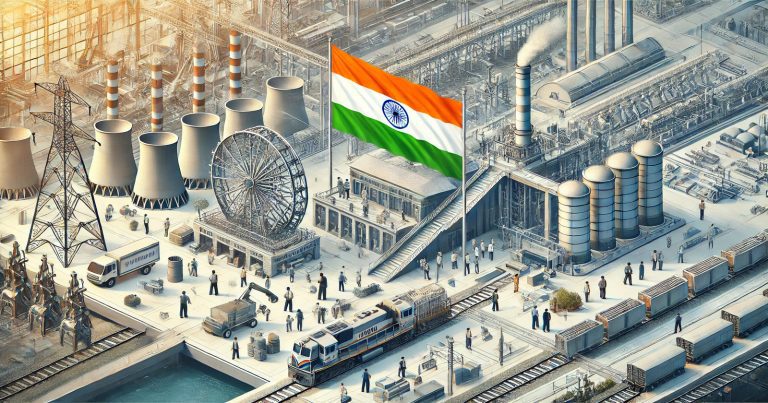Government industry refers to the sectors owned, managed, and operated by the government to promote economic growth, public welfare, and national development. The key work sectors for these industries include energy, transport, banking, and manufacturing, thus stabilising the economy. Government Industry is crucial to India’s development of goods, services, and employment. Various government organisations, such as the Ministry of Commerce and Industry and the Government of India, govern these industries for efficiency and contributions to national development.
What is Government Industry?
The Government Industry involves industries and industrial units fully or partly owned and managed by the government. These operate in key sectors of national security, economic stability, and the welfare of the people. The government controls production, pricing, and distribution to shield against exploitation from the private sector and ensure equity.
Government industries are those industries of the government. These industries run their businesses and function to create welfare for the public rather than gains. Governments directly participate in sectors like railways, energy, banking, and healthcare. These governments include necessary products or services for the people. These industries are regulated or governed by government institutions and ministries like the Ministry of Commerce and Industry in India. While their purpose is service, efficient governmental industries play an important role in positively stimulating the economy and sustaining growth.
Features of Government Industry
The features of Government Industry make it distinct from private-sector industries. Such characteristics help in understanding how government-controlled industries function.
Government Ownership and Control
Crucial for public service, the government owns and manages industries serve a specific function. Decision-making and policy formulation control this, guaranteeing the national goals that should govern such industries. They are supposed to help serve the people and must be effectively managed to serve their welfare better.
Public Welfare Objective
Unlike private industries, where profit-making is mainly the goal, the industries under the government are meant to serve the public. These companies offer products that are affordable, accessible, and of good value to the members of the community. The overall objective is public service, offering necessary products – such as health care, transport, and fuel – at cheap prices.
Investment in Large-Scale Industries
The government invests in heavy infrastructural industries such as railways, power plants, and steel production. Such industries require large amounts of capital, and private investors might be reluctant to invest in such a huge amount. So it is only the government that helps them ensure the successful development of these important economic sectors.
Regulation and Pricing Control
The government controls the prices of essential sectors such as electricity, petroleum, and transportation to ensure these services remain affordable for all citizens. The government controls prices to ensure that people from all walks of life can access essential goods and services, thereby maintaining social balance.
Employment Generation
The paralysis of unemployment from the country is giving people the mass employment opportunity in government sectors. Such industries are big providers of employment hence acting as stabilizers to the economy. In addition, one can see government-owned training institutes, such as the Government Industrial Training Institute, training people and giving them necessary skills to work in such industries.
Support for Small and Medium Industry (SMEs)
The government industries provide small and medium-sized enterprises with raw materials, training, and financial support. The government expands the skills of SMEs through development initiatives, such as the Government Model Industrial Training Institute, to add to national economic development and job creation.
Merits and Limitations of Government Industry
The Government Industry has both advantages and challenges. It is a crucial player in economic development, but bureaucratic inefficiencies and financial constraints limit it.
Merits of Government Company
By combining corporate governance principles with an emphasis on accountability and openness, state-owned companies are good at balancing efficiency, public good, and revenue.
- Effective Management: They are more effective than typical government industries because they follow corporate governance principles. It can employ qualified specialists to make better decisions.
- Flexibility: Compared to other public sector organisations, it works more like a private corporation with fewer administrative obstacles.
- Public Welfare: Public welfare ensures economic growth by equilibrating social responsibilities and profit generation. Concentrates on industries such as healthcare, transport, and electricity.
- Revenue: Provides revenue to the government in the form of tax shares. It funds both federal and state budgets.
- Accountability and Practices: Financial accountability and transparency must be maintained through appropriate auditors under the 2013 Companies Act.
Limitations of Government Company
Government industries offer advantages but face challenges like political interference, operational inefficiencies, and reliance on government assistance that could lower their effectiveness and profitability.
- Political interference: Decision-making processes can be undermined by authoritarian government interference. Often, politics is the source of profit.
- Ineffective operations: Ineffective operations can result from a lack of competitive pressure. Job stability can lead employees to exhibit a lack of accountability.
- Less profit motivation: Economic profit decreases when public profit takes precedence over profit.
- Dependence on government funding: Government agencies rely heavily on government subsidies.
Role and Importance of Government Industry
The role and importance of Government Industry in India’s economic development is very important in boosting India’s industrial development, creating job opportunities, ensuring public welfare, and strengthening government policies. Their efforts also enhance the country’s self-reliance, regionally balanced development, and efficient and robust economy.
Industrial Growth and Innovation
The government Industry aids technological advancement with large-scale projects. They reduce India’s dependence on imports, and their innovation skills drive innovation in critical areas like defence, energy, technology, etc. These companies are making great progress in India by encouraging research and development. Their work helps the country win sustainable industrial development.
They provide knowledge and resources that support innovation. Government companies create infrastructure, thereby providing a firm base for private players to perform. They emphasize developing state-of-the-art technology so that India remains in competition with the world. In doing so, India is less susceptible to external economic forces.
Employment and Economic Stability
Government Industry provide employment opportunities to millions of people in urban and rural areas. Direct employment is in factories and offices, but indirect opportunities in supporting industries are increasing. These actions raise living standards, reduce poverty in underdeveloped areas and support the nation’s overall health.
Government Industry play a role in stabilizing the economy by boosting production and employment during times of economic crisis. They also contribute to greater public confidence by continuing to provide essential services. Such stable contributions protect the economy from sudden shocks and contribute to future growth.
Public welfare and regional development
Government Industry ensures access to essential services such as electricity, healthcare, and affordable transportation. They put the public good above profit and create jobs for people in remote areas. This reduces inequality and improves the quality of life for all citizens.
In rural areas, projects and resources were established for regional development. Differences between regions are bridged by granting opportunities in less developed areas. Their efforts promote balanced development nationwide unity and progress.
Revenue and Policy Implementation
Government services generate revenue for the state in the form of taxes, dividends, and profits. This income partly funds public welfare programs and development programs. The money supply boosts India’s economy and reduces the government’s dependence on credit.
Moreover, they have government initiatives like Make in India and Digital India. In doing so, they ensure that the whole system grows and contributes to its expansion. Thus, India moves forward planned and achieves the program’s long-term objective.
Government Industry FAQs
What is Government Industry?
Government Industry refers to those industries that are government-owned and government-controlled so as to provide the basic goods and services to boost economic growth.
What are the characteristics of Government Industry?
Characteristics of Government Industry: include government ownership, public welfare focus, employment generation, and price control
What are the merits of Government Industry?
Merit for Government Industry includes economic stability, employment generation, industrial growth, and infrastructure development.
What does the Ministry of Commerce and Industry, Government of India do?
The Ministry of Commerce and Industry, Government of India, regulates and promotes industrial growth, trade policies, and market development.
How does the Government Industrial Training Institute support skill development?
Government Industrial Training Institute provides vocational training and technical skills to enhance employment opportunities in different industries.


